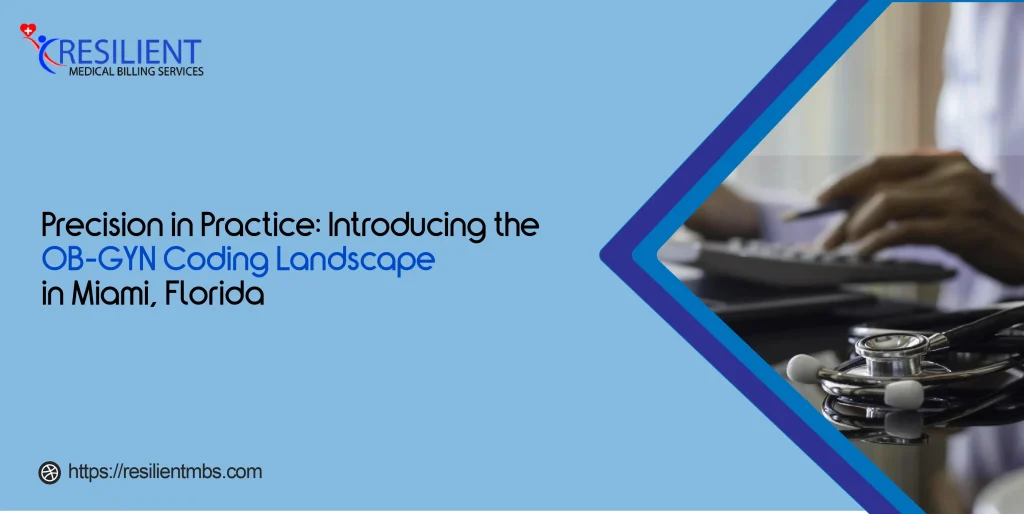Starting OB-GYN coding often referred to as ob Gyn coding guidelines, is like learning the healthcare industry’s hidden language. Top-notch patient care and smooth healthcare operations are OB-GYN practices’ priorities. Obstetrics and Gynecology (OB-GYN) coding is as complicated as a delicate surgery, but it’s crucial to patient care and healthcare providers’ finances.
OB-GYN coding is complicated by a multitude of issues and intricacies that require not just a fundamental comprehension of coding principles but also a thorough awareness of local healthcare specifics.
To traverse the OB-GYN coding maze in Florida and Miami, you’re not just d
eciphering codes but immersing yourself in a world where patients’ unique qualities and state healthcare standards are your compass. It requires a keen eye, a profound awareness of the ever-changing environment, and a knack for coding it all perfectly. Florida and Miami are home to the art of OB GYN billing and coding.
Understanding OB GYN Coding Guideline’s Basics
Obstetrics and gynecology experts are assigned alphanumeric numbers to describe their services. These codes, developed from CPT and ICD-10, offer a common language for healthcare practitioners, payers, and regulators.
Importance of Accurate Coding for Healthcare Providers
Healthcare providers need accurate coding for patient care and financial success, not only for compliance. Proper coding promotes accurate service documentation, enabling efficient healthcare team communication and billing.
Overview of the Coding System Used in the Healthcare Industry
The healthcare coding landscape is dominated by CPT and ICD-10. Healthcare practitioners use CPT codes, developed by the American Medical Association, to document their treatments and services. OB-GYN practices offer everything from regular exams to major surgeries.
ICD-10 (International Classification of Diseases, 10th Edition) codes classify diseases and health issues. ICD-10 codes help diagnose and document obstetric and gynecological diseases.
Understanding these coding systems is essential to navigating the complex world of OB-GYN coding, especially in Florida and Miami’s diverse healthcare scene.
Key OB GYN Coding Guidelines
Evaluation and Management Codes
Evaluation and Management (E/M) codes underpin OB-GYN coding, including anything from office visits to comprehensive exams. These codes are essential for documenting patient interaction time, medical decision-making, and complexity. Documenting OB-GYN care requires knowledge of E/M coding.
Common OB GYN Procedure Codes
OB-GYN procedural codes encompass everything from prenatal treatment to complex surgery. These CPT codes describe obstetric and gynecological services. Mastering procedural coding helps healthcare providers effectively express the nature and complexity of their services to colleagues and billing organizations.
Diagnostic Coding and Specificity
OB-GYN diagnosis coding is essential for patient care and healthcare billing accuracy. Specificity is crucial for accurate patient diagnosis and payment. Detailed ICD-10 codes help OB-GYN providers to document routine pregnancies to severe gynecological illnesses accurately.
Modifier Use and Guidelines
OB-GYN modifiers give details to a service or treatment. Avoid claim denials and ensure correct reimbursement by knowing when and how to utilize modifiers. Modifiers help refine the coding narrative by indicating a service’s procedural aspect or other pertinent information.
Florida-Specific Coding Considerations
Florida OB-GYN coding needs knowledge of state-specific regulations. Florida’s coding standards may vary by healthcare landscape, demography, and legislation. Healthcare practitioners must follow these standards for compliance and proper coding.
The healthcare scene in Florida is always changing. OB-GYN practices may be affected by state-specific code revisions. Staying current with these developments is crucial to avoid compliance concerns and guarantee that coding processes comply with state regulatory norms.
Florida and Miami healthcare professionals must pay close attention to these essential components to master OB-GYN coding guidelines, adapt to the region’s particular coding landscape and remaining abreast of state-specific rules.
Read more about Billing Codes for Physical Therapy Services
Miami's Healthcare Landscape
OB GYN Billing and Coding Challenges
In Miami’s unique healthcare landscape, OB-GYN practices face many billing and coding issues. Here are some of them.
- OB-GYN practices offer everything from simple prenatal care to major surgical procedures, making coding more complicated.
- Misusing modifiers might result in claim denials or underpayment.
- Insufficient or erroneous documentation might cause coding problems, affecting reimbursement and compliance.
Top Tips for Overcoming These Issues
- Coding and billing workers receive ongoing training on the newest coding principles and regulations to reduce errors.
- Use EHR systems for precise documentation and coding. Automated coding tools reduce errors and boost efficiency.
- Find coding anomalies and ensure coding methods meet industry standards and local requirements.
- Healthcare regulations are constantly changing, so being current is essential. Compliance requires a mechanism to monitor and adjust to these changes.
OB-GYN Coding Education
OBGYNs must stay current on medical coding laws and practices. OB-GYN coder training programs are abundant in Florida. FHIMA sponsors coding-related webinars, seminars, and networking. Ob Gyn coding guidelines play an important role in the training also. Florida hosts workshops and seminars about coding issues and improvements. These events give coders insights and hands-on instruction.
Keeping Up with Coding Changes
Medical coding evolves constantly. Florida OB-GYN programs must stay up to date. Regular upgrades ensure coders follow the latest compliance standards and rules, reducing audits and penalties. Coding changes can affect reimbursement rates. Staying knowledgeable helps coders optimize reimbursement by appropriately reporting service complexity. Accurate coding helps healthcare providers communicate and document medical histories and treatment plans.
Conclusion
Understanding Ob gyn coding guidelines is essential to mastering OB-GYN coding in Florida and Miami’s changing healthcare scene. E/M codes, procedural codes, diagnosis coding specificity, and modifier use are examples. Nuanced coding is needed due to local factors like Florida’s coding requirements.
As we conclude, correct coding is crucial to OB-GYN practices’ performance. Coders may confidently manage the field’s intricacies with proper training, education, and coding improvements. Accurate coding is a strategic investment in financial success and patient care, not just compliance.
Get more information for radiation oncology medical billing services.
Florida OB-GYN practices can achieve financial success and good healthcare standards by embracing continual education, utilizing resources, and promoting continuous improvement.
FAQs
OB GYN coding guidelines control the assignment of alphanumeric codes to indicate Obstetrics and Gynecology services. These rules enable accurate patient documentation, transparent healthcare professional communication, and adequate OB-GYN reimbursement. These rules require knowing evaluation and management codes, precise diagnosis coding, modifier usage, and national and state restrictions.
Evaluation and Management codes help document patient encounter complexity. Billing office visits and other evaluation services in OB-GYN practices requires them.
Documenting patient conditions requires accurate ICD-10 diagnosis coding. Diagnostic coding precision ensures patient care, clear communication, and precise reimbursement.
Complex services, modifier usage, precise documentation, and coding adjustments to maximize reimbursement are challenges.
Florida OB-GYN offices should stay updated by joining FHIMA, attending local workshops, using internet resources, and following national and state-specific coding guidelines.










